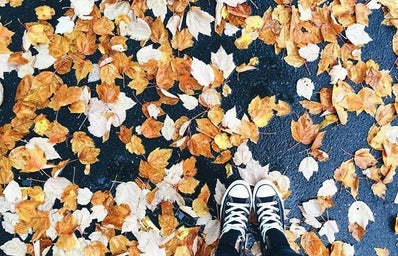Hello. My name is Leonidas Pollakis. I am a third year philosophy student here at the University of Southampton and have been an active member of the University’s Poetry Society since 2011. The Society’s first theme this year was that of the Fall (as in the season). While writing this poem, however, I was toying around with that theme’s connotations and, as thoughts give birth to new thoughts, a stream of ideas came into my head, as if the seed of the word “fall”, having been planted in the soil of my brain, sprouted out into a solitary shoot, with small baby branches and baby twigs; soon enough, however, the sprout grew larger and more stout and firm, finally maturing into a tall oak tree with thick bark covered in lichen. It has now come to full maturity. I present to you the offspring of the Tree, not of Knowledge, but of Art. I use this tree analogy for a purpose, for instead of focusing merely on the Fall season, this poem’s telos also (eventually) touches upon that other, most infamous “fall”–that of the “Fall from Paradise”. It shall be noted, however, that this is not exactly like the Abrahamic Fall in that the Adam of this story never is “given” a companion. Rather, he waits for one. And, in waiting, is transformed into the serpent of our story. Now, if one is familiar with Jungian psychology, one will easily notice that the serpent, the snake that eats its own tail at the base of the tree of life, is a symbol of the world–the world guardian, as it were. This, in turn, has certain materialistic overtones echoed in Wagner’s Das Rhinegold in which Alberich, in search of love, attempts to woo the three Rhine Maidens who protect the Rhine Gold. They sneer and laugh at him–so much so, in fact, that he comes to renounce love for material pleasures (i.e. the Rhine Gold). Once forged into a ring, this gold gives Alberich the power to control the other gnomes, who become slaves to Alberich and delve deeper and deeper into the earth in order to gain more and more gold. On the other hand, Wotan, the law bearer, in an attempt to reign supreme amongst all others, has traded Freia, the goddess of love, to the brother giants Fasolt and Fafner in exchange for their building for him a luxurious fortress of the Gods called Valhalla (mirroring Alberich’s renouncing love for material pleasures). The other gods and goddesses, however, upon learning about this plot, attempt to dissuade him, albeit to no avail seeing as he, being the God of the Law, cannot renege on any agreement or promise. Thus, he makes the giants a deal: if he can steal the Ring of Power from Alberich, including all of his wealth, he will agree to give it all to them in exchange for Freia. Upon agreeing, they take Freia hostage. This has an immediate effect on the gods and goddesses, however, for, since she is the only one that can tend to the orchard which produces the fruits which the gods and goddesses eat. Without those fruits, the gods and goddesses lose their strength and fall into a state of lethargy (moral: even the gods and goddesses cannot live without love). To make a long story short, once the gods have stollen the ring from Alberich, Alberich curses the ring to bring only unhappiness and misery to those who wear it (are you seeing the correlation between The Ring Cycle and The Lord of the Rings?). And indeed, when the brothers trade Freia for the gold (and the ring), when dividing up the winnings, in a fit of jealousy, Fasolt kills Fafner, who thereupon turns into a dragon because of the heinousness of his crime. As you will see, I use the tragic figures of both Alberich and Fasolt in order to embody, not the fall from God’s paradise, but from the paradise of ever falling in love. But, I am trying to say something much deeper. I am trying to criticise materialist/romantic tendencies of society. Materialism and romanticism have corroded our love lives–or, at least, our expectations of what love should mean. The materialists either become automata–hollow shells where their souls should be, lethargic just like the Norse gods and godesses—-in that they do not truly understand the true value of love; or demons–hoarders of false hope in darknesss–who, in idealising something other than love, become unnatural and hated things, not understood by society. The romantics, on the other hand, build their dreams on mere (possibly past) images of Love–of their own personal “Paradise Lost”. In putting those icons on a pedastal, they become powerless. They sit; they wait; and, in the end, become misunderstood. So they become pessimists. And, like milk that has been left out of the fridge for too long, their souls begin to curdle–sour to the very pit. Like Alberich, they not only curse love–they curse everyone who has it as well. And, as though by default, they become “dragon” materialists–they spit out flame and consume not only themselves but the entire world as well. Their gift to life is blackened desolation–winter has already set upon their souls. Only in this way are heroes to be born. I gum and shoes and cigarettes everything used, fallen, and forgot on dirty pavements, dirty bins, in front of apartments built in archaic, Communist style. travel billoards on the mind ever metamorphosing yet ever, ever still— no destination ever named. fumes rise from shiny coffins, dead from morning, dead at night moving for moving’s sake with no rose buds on the brain— just smoke, fume, spit and ash— fertiliser for finer thoughts…
Avoidance of a name.
II At a park bench, underneath a broad oak tree, in all its verdure and perfume, I wait and watch, in the prime of my youth, for the doves’ windfall of gentle feathers to brush my fevered skin—to somehow make me whole once again. III …Remember ‘Eva, when young? How full of unbridled life and strife were we! With my beautiful, brown-eyed ‘Eva…we ran through bronze fields of catching grass—a field of paradise, with swords of softness—no need for shields! —Just soft, scratchy catching grass,
scratchy grass,
catching grass…
Catching!
Ever catching!
Swaying with the wind. We were swaying with the wind.
…Innocent catching grass.
But then the grass loses its grip. Falls, tired, from our clothes.
Just as the grass—
—we lost our grasp.
‘Eva is just a memory eating at my mind.
A wish for something more that will remain a nothing
ever more…
IV Do the birds ever come? … I see them at a distance.
I coo, wooing them with my call.
Will the birds ever come? Or will the geese keep flying south? Never do they come.
Summer comes instead.
V In the summer, there comes a wood elf—a pale, rosy wood elf—and sings a song so sweet and so complete that my heart strings grow too tight to even play. And though I have a love song to meet her own, a silence pervades the halls of the wood. All I can compose is sheet music, but she tears the pages, laughs, and scampers off into the woods, leaving me with torn pieces of my heart scattered in the brush. And I feel the Fall
—the falling of the leaves—
The colours of my brain—
growing dark
and tired
and strained
with the mist that’s in my heart.
And the falling of the rain, patting ‘gainst the grain of the bark. VI I coil, crestfallen, at the bench ‘neath the tree till I’ve coiled myself round one last ideal —an ideal still clinging on my heart, catching at an old pants leg. A bronze sword in the granite stone of my heart. My brown-eyed
‘Eva
gazing through
the
mist
and the hail. I cannot save that ideal.
That ideal implanted in my youth is the poison that I have been drinking all these years
—my own Original Sin.
And now, shall I die of a self-inflicted malady? Of a bit of catching grass clinging to the heart? It is scratching at the fibre of me —a malignant carcinogenic. Scratching at my heart’s flesh. Paper cuts on the heart! A vessel so full that my cup is
overflowing…
Drive it out! Pluck it out! Have you no sense of shame!? [crieth my father]. Pull it out! Tease it out! Softly now, or it shall be your bane! [pleadeth my mother]. And the geese keep leaving.
And the leaves keep
f
a
l
l
i
n
g
. .
Until, not unlike Alberich, I have cursed love. And, not unlike Fasolt, my sin has transformed me into a demon— into the
slithering
snake
at the base
of the tree
of life! VII Hss! Hss! Hssssssssacrifice thine power, the engine of thy soul— Your sense of satisfaction at your ever being whole! Eat the fruits of malcontent and delve the Earth like a miner in Greed, satiating your need for love with love of other things. Things that ne’er will leave you, ne’er will desert you… Become the serpent of the night! The Antithetical Might! Eating your tail till
you
send
yourself
to Hell!
OR
Destroy the world—set it all to flame! The reward is just—she should have had more shame. Light life’s pyre with the remnants of your fire! Let that whore of a tree tease out a new name: “Liar”! If not fruitful, torch that godforsaken tree! Then to ash, to ash, to ash! Then to ash let it all be! VII A golden fountain, not of water but of flame, rises higher, ever higher Driving the dried, fetid leaves and bark to screams—a pyromaniacal lyre Strumming out the matured songs—no longer sheet music—of sadistic ecstasy. The composition, however, has not yet reached its finale. The dragon’s heart of stone, hearing its own music, begins to break And, in an eruption of bitter pity gilt with lust, the dragon curls himself round the woman’s phallus in submission to their mutual rape—the fruit of a life full of rust. VIII Tears and resin drip from the nuptial bed Where fire bled out and washed them both in red. Winter has come, washing the scene with snow. And nothing besides remains—nothing, ‘cept the sword in the stone. POST SCRIPTUM: If anyone is interested in joining the University of Southampton’s poetry society, you are more than welcome to come to our Monday meetings from 6-8pm in Meeting Room 2 in the SUSU building. You can also visit our Facebook Page at https://www.facebook.com/groups/sotonpoetrysoc/675372389148317/?notif_t=group_activity (N.B. The information in the page’s header regarding the meeting time and location is inaccurate, so please just ignore the header’s information–everything else on that page is up-to-date).

